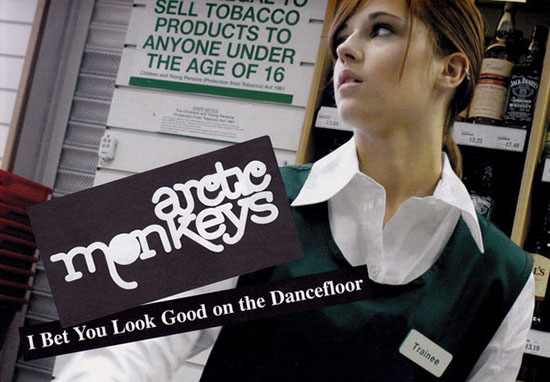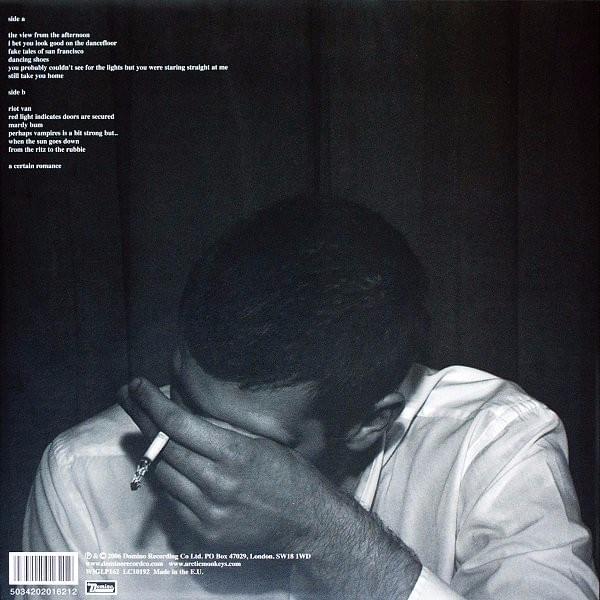‘I just wanted to be one of The Strokes’, laments frontman Alex Turner, on the opening line to the latest Arctic Monkeys album, 2018’s Tranquility Base Hotel and Casino.
This is the last thing you’d expect to hear crooned over the cinematic space pop shimmer of Tranquility Base, an album worlds away from the earnest garage rock strut of indie torchbearers, The Strokes. For Turner, the line is a little note to self, reminding him of his major transformation as a songwriter since the Arctic Monkeys burst onto the scene with their seminal debut album, Whatever People Say I Am, That’s What I’m Not.
By the time Whatever was released, on 23 January 2006, the hype behind the Monkeys so was great that it became the fastest-selling debut album in British chart history; to this day no band has surpassed such an achievement. Four scruffy teenagers from Sheffield charmed their fans and the music press with a candid portrait of urban nightlife, romance, and the human condition. The interplay of these themes in many ways makes Whatever a concept album. It romanticises a carefree adolescence spent on the streets and in the boozer, against a zealous punk aesthetic, rebranding The Strokes’ blazing indie rock sound as distinctly British.
The album opens with the thunderous ‘The View from the Afternoon’. Turner and fellow guitarist, Jamie Cook, relentlessly hammer away at an A major chord in true punk style, atop Matt Helders’ booming drums and Andy Nicholson’s winding bassline. In the verses, Helders’ feverish grooves scurry away underneath veering chord progressions, which Cook and Turner’s guitars play tennis with. With all four band members on top form, it’s one of the strongest opening statements of any classic album.
Whilst ‘The View from the Afternoon’ anticipates the night ahead, the next track rushes headlong into it. Also the band’s debut single, ‘I Bet You Look Good on the Dancefloor’, has become a staple on the soundtrack of every British night on the town. Kicking off with rapid snare drum bursts and an unhinged ascending lead guitar riff, the track’s adrenaline is unrestrained from the very first second. Turner invites us to dance ‘like a robot from 1984’ over a breakneck tempo, an Orwellian hint which resurfaces on the dystopian Tranquility Base twelve years later.

In the same vein as the album’s inordinately long title is, ‘You Probably Couldn’t See for the Lights but You Were Staring Straight at Me’. Turner’s lyrics describe the awkward breakdown of all ability to function when talking to a love interest, an experience any introvert can instantly relate to. ‘And if it weren’t this dark you’d see how red my face has gone’, he breathlessly yells, with such gusto that his internal monologue becomes borderline comedic.
Turner’s thick Northern accent and wit are distinct features of the band’s lyricism, with the rough constraints of his early vocal ability giving the Monkeys’ debut album its rustic charm. Turner opens ‘From the Ritz to the Rubble’ with a spoken anecdote about two bouncers which seamlessly slips into a vocal melody as the music builds underneath. On ‘Fake Tales of San Francisco’ is the harsh ego-dampening reminder, ‘You’re not from New York City, you’re from Rotherham’, sung during a bombastic outro which shrinks into chirpy guitars and jazz-inflected drums.
‘Perhaps Vampire Is a Bit Strong But…’, aside from the hesitancy of the title, wields the same weight of lyrical savagery as Queen’s 1975 diatribe, ‘Death on Two Legs’. It’s a fierce declaration of the band’s status as indie music underdogs, and a brazen takedown of their critics. The dissonant guitar chords which screech over the song’s jam-like interlude echo its cutting lyrics, a neat touch of musical and lyrical interplay.
Toning things down are ‘Riot Van’ and ‘Mardy Bum’. The latter is a gorgeously uplifting song about the cheering up of a sullen girlfriend, with laughing, joking, and cuddles in the kitchen. It has a riff so effortlessly singable that it’s become a major crowd favourite at concerts. Also a major crowd-pleaser and hit, ‘When the Sun Goes Down’, unabashedly alludes to prostitution, figuring as a modern reworking of The Police’s classic hit ‘Roxanne’, a magnificent song whose legacy has unfortunately been bastardised by a drinking game.
Yet, it is the greatest song that serve’s as Whatever‘s closing track. In NME’s recent mega-ranking of the Arctic Monkeys’ entire catalogue, ‘A Certain Romance’ takes the number one spot, a choice that comes as no surprise. It’s a magnificently bittersweet ode to the band’s humble city of Sheffield, as the idea that ‘there ain’t no romance around there’ simply becomes ironic. The song illustrates the cast of characters at the heart of any hometown – whether that’s a drunk troublemaker, kids scrapping with pool cues, or simply old friends. With a blazing outro that gloriously coasts towards a poignant close, it distils the album’s entire ethos into a powerful five-minute conclusion.
The Arctic Monkeys have been musical chameleons throughout their history. With indie as their umbrella, they’ve churned out youthful anthems on Whatever and Favourite Worst Nightmare (2007), which gradually transformed into the polished commercial rock of AM (2013). You’d never tell that Tranquility Base was cut from the same cloth as Whatever, were it not for Turner’s discreet lyrical references back to the band’s heyday. Nonetheless, their debut album remains their best, having aged gracefully to classic status, and captured the noughties ethos with such honest exuberance. Whatever is the most beloved anthem for a generation who owned Nokia bricks and impressive CD collections, and it’s still a joy to return to 15 years later.
